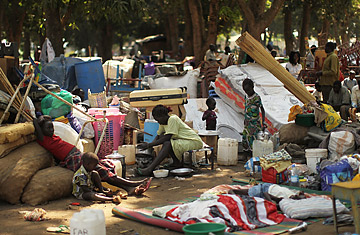
Internally displaced south Sudanese sit with their belongings at a port in the southern Sudanese city of Juba on January 11, 2011.
Sudan and South Sudan are plunging deeper into conflict, raising global fears that war could break out again between the two sides. In one of the more serious diplomatic setbacks since South Sudan's secession last July, a meeting scheduled Tuesday between Sudanese President Omar al-Bashir and his southern counterpart, Salva Kiir Mayardit, was canceled at the last minute, preventing what would have been only the second summit involving the leaders since the south's independence. As a result, the fate of a half million South Sudanese citizens living in the north hangs in the balance.
Tensions have been building between the bickering neighbors for months. In February, the countries failed to resolve a dispute over transfer fees imposed by Sudan on oil shipped from the south. Then, after the two governments reached a framework agreement last month to give each other's citizens more freedom to move between the two nations and vowed to "accelerate their cooperation" to repatriate people stranded on either side of the border, a new round of clashes in Sudan's Heglig oil region prompted al-Bashir to call off Tuesday's meeting to solidify the agreements. A flurry of negotiations over the weekend failed to repair the damage and salvage the summit.
Jill Helke, the Sudan chief for the International Organization for Migration (IOM), said the setback is indicative of the unpredictable nature of relations between the countries at the moment. "Most things in Sudan happen at the last minute and there is a great capacity for surprise," she tells TIME. "People seem to be just another card in these negotiations," she adds. "Things like oil are more important."
The people most at risk are those caught in the middle, particularly the southerners trapped on the wrong side of the border and facing an April 8 deadline to leave. Sudan imposed the deadline in February, when it signed a nonaggression pact with the south — one of the stipulations was an estimated half million ethnic southerners living in the north would be required to either "regularize" their status (which the government was rather vague about) or repatriate to South Sudan by that date. Up to now, the U.N. High Commissioner for Refugees has already registered 120,000 southerners who were willing to repatriate immediately, while the IOM reports that an additional 11,000 South Sudanese are stranded and waiting for transportation at the border in the north.
Most South Sudanese living in the north are undocumented and, thus far, neither government has made much effort to provide guidelines on how they can apply for visas or citizenship. Sudan has not indicated what will happen to southerners once the deadline passes, only saying they will be regarded as foreigners, raising concerns over a mass deportation in the near future.
Though the agreements reached between the sides in March helped ease the strain on humanitarian workers trying to move South Sudanese citizens home before the deadline, the breakdown in talks has thrown the situation into chaos again. The IOM, which depends on donations to fund its operations, helped move more than 23,000 people to South Sudan last year — mostly by river barge — and will complete a plan to fly another 2,200 elderly and disabled people to the south over the next week. "The flights will be the last thing we can do before April the 8th," Helke told Agence France-Presse. Samantha Donkin, an IOM spokeswoman, tells TIME there may be as many as 700,000 South Sudanese left in the north. "We don't actually know the figure of the caseload," she says.
One of the main impediments toward repatriating South Sudanese citizens is the fact that nationality laws in both Sudan and South Sudan are vague, leaving many people uncertain of their citizenship status and whether they need to leave the country at all. Sudan has long attracted migrants from all over Africa and the government recently acknowledged there are an estimated 4 million foreigners living in the country illegally. Without clear guidelines from either government on how to acquire citizenship, Helke says many South Sudanese are stuck. "There is so much contradictory information, and lack of the sort of information that people actually need," she says. "I worry that the absence of specific information or rumors will cause southerners to panic and create a humanitarian crisis."
The ambiguity over who needs to repatriate and who doesn't has made the IOM's work extremely difficult. With the recent outbreaks of violence in the South Kordofan region and Heglig — both of which are along the contentious border — all commercial routes between the countries have also been closed, leaving the IOM short on transport options. Helke says she hopes the governments will soon give the NGO permission to transport people by river barge again. But even if the bureaucratic hurdles are resolved, Donkin says the impending rainy season will also make it nearly impossible for such a large-scale movement of people to take place.
The situation remains mired in the bitter history of violence and distrust between the two sides, but Helke insists that people are generally optimistic. After all, South Sudan acquired its independence following a referendum that no one thought could happen. "There is a sort of faith that despite all of these horrible signals that maybe this will somehow work itself out," she says. "They've managed to muddle through so much. We hope that they will manage this one too."
